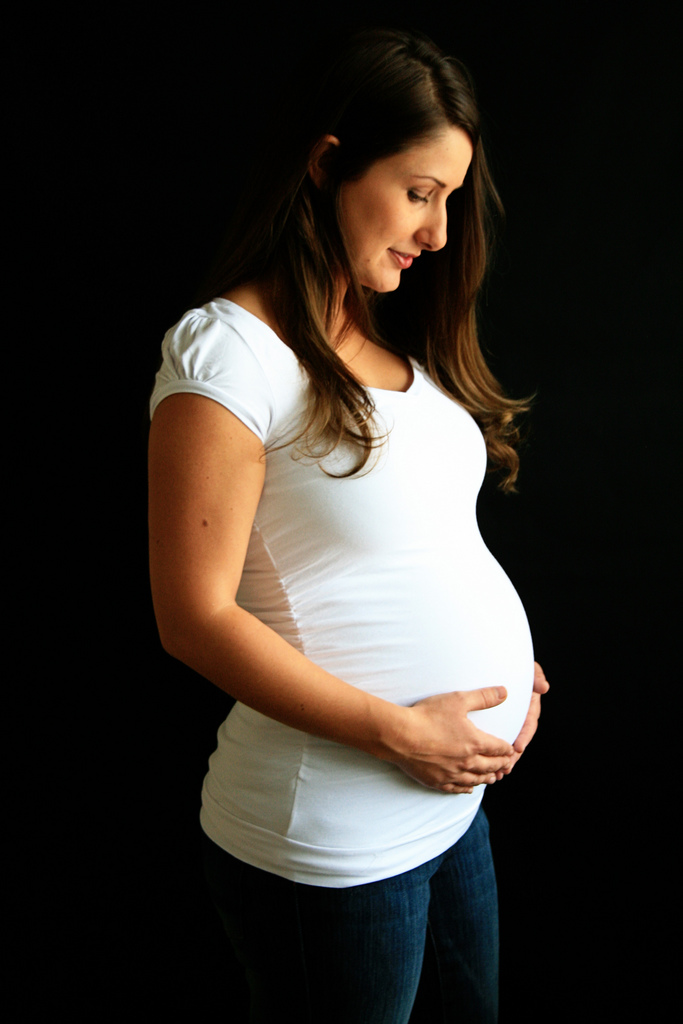by Tatiana Bryan Christensen
How do you feel when you see a pregnant woman? Jealous? Superior? Piteous? Congratulatory? Is it a combination of these or other emotions? Do you look to see how many children she has in tow, doing mental calculations based on their apparent ages to see how far apart she has spaced them? Do you wonder if she has a job, and if so, whether it will give her maternity leave? Do you guess at her age, and infer thereby a high-risk pregnancy, or alternatively, an unplanned teenage pregnancy?
It’s easy to judge other women on their reproductive choices. There are obvious outward signs of those choices — a growing tummy, a passel of rugrats surrounding a woman they call “Mommy,” or the lack of these things. We see the signs, and we draw our own conclusions based on what can be seen. But should we? Are we doing other women a disservice by making these assumptions about them?
My own experience in the exciting field of parenthood has been typical, in that it has been unpredictable, complex, and at times very difficult. I am a practicing Mormon, which means that I grew up being taught and believing that bearing and rearing children is a major part of God’s plan for me. I got married at age 25, in between my first and second semesters of law school, and was eager to get on with that plan, so I set to work coaxing, cajoling, and convincing my husband that having our first baby during law school was a good idea. He was hesitant, but I eventually won him over, reasoning that whatever morning sickness or other maladies I experienced wouldn’t be more than I could handle.
Morning sickness, I soon learned, is a laughably inadequate moniker. The official name for what I experienced during my first pregnancy, which occurred during my third year of law school, is hyperemesis gravidarum. Its symptoms are extreme nausea and persistent vomiting, which in turn cause malnutrition, weight loss, and dehydration. At one point, I had to have intravenous fluids to re-hydrate. I was prescribed an anti-vomiting medicine that I took until I was 28 weeks along, and gradually, the symptoms got better. But I was still nauseated 24 hours a day, 7 days a week for the entire pregnancy, and clinically depressed for much of it as well. I missed six straight weeks of law school classes. I had suicidal thoughts. I wondered if my first child would be my only child.
In short, pregnancy was the most miserable experience of my entire life. And yet, when my son turned three years old, I decided to try again. I wanted another baby, I wanted my son to have a sibling, and I thought, even hoped, that maybe it wouldn’t be so bad the second time around.
It was even worse. I will not bore you with the disgusting details, but it was worse. I’m not saying all this to have the readers of this post pity me. I’m trying to make a point — that on the outside, I’m sure there have been people who have looked at my family, especially in the Latter-day Saint culture of which I am a part, and wondered why we have chosen to have “only” two children, or space them apart so much, or why we waited a couple of years after we were married to have them. I’m sure there are others who have wondered why I didn’t stop at one. Because I was in law school, some people assumed that I, not my husband, was the one who wanted to wait to have children. Many did not understand the degree of suffering I went through to bring my sons to term. One lady said to me, after I complained about how I felt, “Well, they’re easier to take care of in than out.” I wanted to punch her. When I said that I wanted to wait a couple of years and recover after the birth of my first son to have another, my cousin said, “No, it’s better when you have them closer together.”
Maybe it was better for her; I just knew it wasn’t right for me. But that’s just it — isn’t feminism about supporting whatever choice a woman makes for herself? Like I said before, it’s easy to pass judgment on someone based on the outward indicators of pregnancy, motherhood, or the lack thereof. It’s also very easy to be wrong. Often, a lack of children is not a choice. I know several couples in my neighborhood who would love to have children, or more than they currently have, but cannot because of infertility. There are physical and mental ailments that make it impossible, difficult, or unwise to have children. Financial considerations sometimes make having children untenable. The prejudices and hurtful comments go the other way, too. A friend of mine has seven children. I made assumptions about her and even questioned her judgment, especially because some of her children have had serious medical issues… until I found out that many of her children were conceived despite the use of birth control. And I know by experience that the bearing and rearing of children, or lack thereof, is an emotional minefield for women, and the judgments we pass on one another can be very painful.
So, the next time we see a pregnant woman, let’s try to put ourselves in her shoes, which are undoubtedly uncomfortable because her feet are swollen, and refrain from judgment. That may be good advice for dealing with non-pregnant women, too.
 Tatiana has been, at various times and places, a Waffle House hostess, dog walker, actress, administrative assistant, student, door-to-door newspaper salesgirl, missionary, and nanny. She works currently part time as an attorney, representing victims of domestic violence in family law actions, and works full time as a wife and mother of two young boys. She belongs to one of the largest women’s organizations in the world — the service-oriented Relief Society of the Church of Jesus Christ of Latter-day Saints. She has lived in Florida, New York, Chile, and England, and now makes Alpine, Utah home.
Tatiana has been, at various times and places, a Waffle House hostess, dog walker, actress, administrative assistant, student, door-to-door newspaper salesgirl, missionary, and nanny. She works currently part time as an attorney, representing victims of domestic violence in family law actions, and works full time as a wife and mother of two young boys. She belongs to one of the largest women’s organizations in the world — the service-oriented Relief Society of the Church of Jesus Christ of Latter-day Saints. She has lived in Florida, New York, Chile, and England, and now makes Alpine, Utah home.
Originally published on May 7th, 2012





13 comments
Moms judge moms, deal with it!
As to the first question posed in this article:
When I see a pregnant woman, my first thought, sadly, is concern that her child has, at best, a 50/50 chance of growing up in an intact family.
Judgmental?
I think that trying to put oneself in someone else’s shoes is excellent advice. It is also good to remind judgmental people that a woman’s reproductive rights are nobody else’s business. Period.
And that includes exercising her right to choose.
Hello, just wanted to say, I loved this post.
It was practical. Keep on posting!
Hello all, here every person is sharing these know-how, thus it’s good to read this website, and I used to go to see this web site everyday.